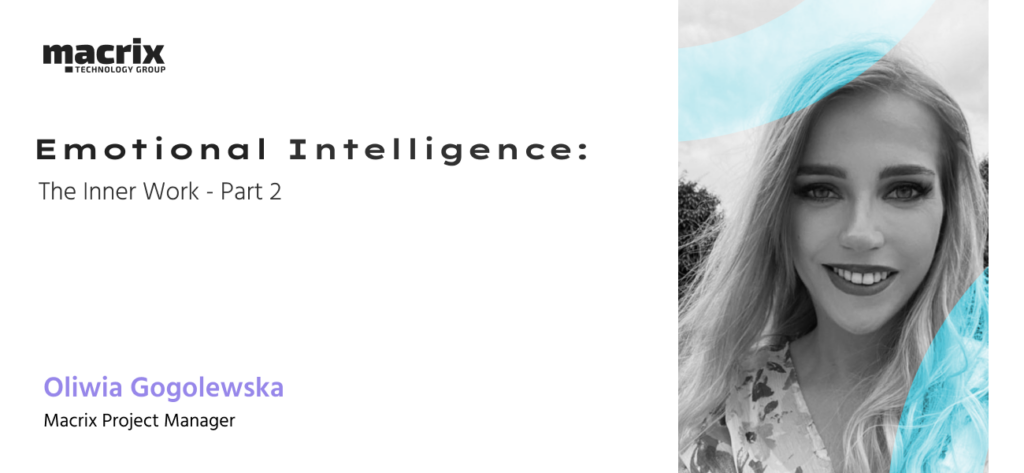
Remember our journey into the realm of Emotional Intelligence (EI) in “Emotional Intelligence: Navigating Emotions – Part 1”?
We discovered how emotions, once overlooked, have evolved into essential forces shaping both our personal and professional lives. We explored Goleman’s EQ theory and identified five important parts of EI: self-awareness, self-management, self-motivation, empathy, and social skills.
Now, let’s dig deeper into how self-awareness, self-management and self-motivation can change your life. Ever wondered how nurturing these skills could enhance your relationships, decision-making, and overall well-being?
In this article, we’ll focus on these personal aspects of EI. We’ll not only explain what they are but also provide you with simple tips and real-life examples to help you practice them every day. Are you ready to discover how these skills can help you become your best self? Let’s start this journey together!

Self-awareness
Know thyself. — Socrates
At the core of emotional intelligence lies self-awareness, the ability to identify and acknowledge our emotions as they arise. Self-awareness is also an understanding of how our emotions can affect our performance.
Self-awareness is like looking deep into our emotional mirror and understanding our feelings, strengths, weaknesses, desires, and motivations. A person who is self-aware is being honest—with themselves and with others.
For example, someone who is exceptionally self-aware can catch themselves during an interaction and self-reflect: I’m being defensive right now. I am getting annoyed – but do I have a reason to? Why does it affect me so much emotionally? Why do I react to it like that?
Let’s consider the following example in the workplace:
Meet Noah, a technical leader in a software development company. He is assigned to lead a project for a demanding client, one who frequently changes project requirements and has high standards. Noah recognizes that this client’s behaviour can be emotionally challenging.
Noah’s self-awareness allows him to identify his emotional reactions when dealing with a client. He notices feelings of frustration, anxiety, and even defensiveness arising during interactions. Instead of letting emotions overwhelm him, he asks himself constructive questions on how he can address the client’s requests and manage the client, all while understanding the underlying causes of these emotions.
Noah’s proactive approach involves discussing his concerns with his team and seeking constructive ways to manage his emotions. Noah’s self-awareness doesn’t just help him; it also brings the team together, making work more productive.
In the above example, we can see a technical leader taking a proactive approach to assess his emotions. He’s self-aware, which doesn’t mean the situation isn’t challenging, but rather that he recognizes how it affects his emotions. He is honest about it with himself and with his team. His attitude allows him to prevent potential conflicts or escalations and get support from his team when needed.
How can you improve your self-awareness?
How can you improve your self-awareness?
- Reflect: Spend time on self-reflection. Identify and name your feelings. Consider the root cause of every emotion.
- Question yourself: When you are faced with an emotionally challenging situation ask yourself “Why am I reacting like this?”, “Why do I feel like this?”.
- Journalling: Write down your feelings and experiences. Watch how they transform over time.
- Mindfulness (“Be here now”): Practice being fully present in the now, focus your thoughts and attention on what is happening in the present moment, rather than thinking about the future or the past.
- Feedback: Reach out to friends and colleagues for their insights! It will help you identify your weaknesses and strengths.
By observing your responses and asking yourself self-coaching questions, you will get to know yourself better and improve your self-awareness.
Self-management (Self-regulation)
Between stimulus and response, there is a space. In that space lies our freedom and power to choose our response. In our response lies our growth and our freedom. — Viktor Emil Frankl
Words said by Viktor Emil Frankl, an Austrian psychiatrist and psychotherapist refer to the second component of Emotional Intelligence: self-management (self-regulation).
Self-regulation involves the ability to control our emotions so that they fit the situation. It means managing disruptive emotions and impulses by thinking before acting. Self-management is like creating a pause button between our feelings and our actions, allowing us to control and tame our emotions. In short: keeping our emotions in check. Self-regulation also involves the ability to rebound from disappointment. People, who have this skill on a high level can recover much faster after setbacks or failures.
Self-management is highly related to self-awareness. We can successfully control and manage our responses if we are aware of our reactions and remain present in challenging situations.
Let’s consider the following example in the workplace:
Meet Mia, an executive who’s leading a critical project presentation to the company’s board of directors. Despite being very well prepared, she faces a lot of tough questions and unexpected, negative feedback. This triggers strong emotions of frustration and disappointment.
At this moment, Mia’s self-regulation skills come into play. Instead of reacting emotionally or getting defensive, she takes a deep breath and composes herself. She suggests a short break so she could collect her thoughts and prepare the responses. During this pause, she assesses her own emotions, reminding herself of the need to stay objective and focused on the organization’s best interests.
After the break, Mia manages to remain calm and provide thoughtful responses to the board. Her ability to control her emotions and stay calm contribute to the productive board meeting and set a good example. Imagine things going the opposite way – an executive losing her temper and leaving the room due to nervousness. It wouldn’t contribute to anything positive, would it?
Despite our best efforts, we can sometimes face situations in the workplace when we do not receive feedback as positive as we would hope for. In such cases staying composed, taking deep breaths and asking for a short recess might come in handy. In tense situations, our attitude and behaviour may be what makes it or breaks it.
How can you improve your self-management?
- Self-awareness: To begin, focus on developing self-awareness. Identify the situations that tend to spark strong emotions in you and consider how to handle them. When we recognize our triggers, it becomes simpler to manage our reactions and anticipate challenging scenarios. It is self-awareness that helps us respond more effectively.
- Use Relaxation Techniques: Techniques such as deep breathing and meditation can help you calm your mind and body and reduce feelings of stress and anxiety. When emotions run high, taking a moment for deep breathing can help you regain control and think with clarity.
- Ask for a Breather: When you find yourself in demanding situations, such as managing a presentation with tough questions, consider asking for a short break. You might simply express the need to collect your thoughts and prepare your responses. A brief break allows you to gather your thoughts and return with a calmer mind.
- Communicate your Emotions: Don’t be afraid to express your emotions, but do so with clarity and kindness. It’s not about pouring out every emotion in every situation, but rather articulating your feelings when it can lead to understanding and resolution. This approach prevents misunderstandings, helps in conflict management, and strengthens your relationships.
- Use Cognitive Reframing: Try adjusting your thoughts about a situation to influence your emotional reaction. For example, instead of thinking: “I’m terrible at public speaking, and I’ll embarrass myself during the presentation.” try thinking, “Public speaking is a skill I’m working on, and with practice and learning I can improve my abilities. I might feel nervous, but it’s a chance to learn and grow.”
- Ask for Feedback: Invite trusted friends or colleagues to share their observations about your emotional responses. Their insights and suggestions can provide valuable guidance and enhance your self-management.
- Practice Empathy: Try to understand the viewpoints and emotions of others. Doing so contributes to a reduction in potential conflicts.
Reflect and Grow: After emotional experiences, reflect on your reactions and consider how to improve in similar situations. Learning from your experiences is a key step in improving your self-regulation skills.
No matter which method(s) you choose, remember that in every situation, you have three choices: avoid, approach and attack. Although your emotions may push you in one direction, know that you can decide how to react. Consider the kind of person you aspire to be, and then respond accordingly.

Self-motivation
The best way to predict the future is to create it. — Peter Drucker
Motivation is a driving force behind human actions. When we imagine our goals and dreams, motivation is what helps us to turn these goals and dreams into reality.
There are two main types of motivation: external and internal.
External motivation, also known as extrinsic motivation, relies on external rewards or punishments. These can be things like salary increases or promotions as rewards, but also reprimands or job loss as punishments. When people are externally motivated, their primary focus is often on obtaining the reward or avoiding punishment. The problem is that when we’re only externally motivated, our passion and drive might not be as strong as when we’re motivated from within.
Internal motivation, also known as intrinsic motivation, comes from our own personal desires, values, hopes and dreams. When we’re intrinsically motivated, we feel happy, genuinely interested and invested in what we’re doing. Self-motivation is a form of intrinsic motivation, as it’s driven by our own goals and inner desire to achieve.
Self-motivation means that we don’t rely on external factors to drive us. Instead, our motivation comes from within, from our own interests, values, dreams and passions. This type of motivation is a key part of emotional intelligence and is especially important for people in leadership positions. A motivated leader shows dedication, passion, and a strong focus on achieving their goals. Their positive energy is contagious and inspires their teams to pursue their own dreams and passions.
Let’s consider the following example in the workplace:
Meet Elijah, a marketing professional who’s tasked with a challenging project that involves creating an advertising campaign for a very big and prestigious client. The project not only has tight deadlines but also requires eye-catching, modern and unique solutions.
Elijah’s self-motivation comes into play in this scenario. To avoid feeling overwhelmed by the importance of the task, he breaks it down into smaller manageable pieces and creates a roadmap with achievable milestones. Apart from that, he also allocates specific time slots in his daily schedule for research, content creation, and client communication.
Most importantly, the task aligns with Elijah’s professional interests and growth goals. He always seeks for inspiration in different places and collaborates with colleagues to brainstorm fresh ideas. He sets his own high standards for the project as he genuinely enjoys the process of strategizing and implementing a marketing campaign for the client. The task itself aligns with his own development goals.
Elijah’s internal drive does not only inspire him but also the people around him. His dedication and enthusiasm are a great morale boost for his team and it also sparks their own motivation.
How can you improve your self-motivation?
- Find Your WHY: Start by understanding why your goals are important to you. Knowing the reason behind what you want to achieve can give you a real motivational push. For example, if you want to learn a new skill, your “why” might be personal growth or pursuing a passion.
- Define Who You Want To Be: It starts with self-awareness. Take a little time to think about who you are now and who you’d like to become. What qualities or changes do you want to make? Once you know, become that person.
- Visualize Success: Imagine yourself successfully reaching your goals. This exercise can boost your motivation. For instance, if your goal is to get a promotion, envision yourself in that new role, confidently handling new responsibilities. Visualizing your success can help you stay motivated and focused on your career goals.
- Create a Vision Board: Get creative by making your own vision board! A vision board is a visual representation of your goals and dreams that contains all kinds of images, quotes and text. Place it where you can see it regularly and it will serve you as a visual reminder of your aspirations.
- Baby Steps: To see progress, it’s helpful to break your goals into smaller, manageable steps. Clearly define what you need to do, and keep an eye on your progress. For instance, if your goal is to declutter your home, start with one room at a time and look how baby steps take you where you want to be.
- Celebrate Small Wins: Don’t forget to pat yourself on the back for even the tiniest achievement. It’s a way to keep your spirits high and your progress visible. Whether it’s hitting a fitness milestone or completing a work project, taking a moment to celebrate keeps your enthusiasm alive.
- Create a Routine: Make a regular daily or weekly plan that includes dedicated time for your goals. This routine brings consistency and structure to your efforts, making it easier to stay motivated. For example, if you’re working on a creative project, allocate a specific time to focus on it.

Self-motivation – as you can already imagine – is highly linked to self-awareness. When we have a clear understanding of our identity and our goals and dreams, we become capable of actively pursuing our aspirations. On the other hand, if we do not quite know who we are and what we would like to achieve, we could get stuck. This is why it is important to get to know yourself and define who you would like to be.
While external motivation has its place, it’s when our work and personal activities align with our goals, passions, and dreams that we reach our highest potential. Learning self-motivation can lead to more success in both work and personal life.
Closing Thoughts
Remember the wise words of Lao Tzu, an ancient Chinese philosopher, who said, “Knowing others is intelligence; knowing yourself is true wisdom.” Aristotle, the influential Greek philosopher, echoed this sentiment by stating: “Knowing yourself is the beginning of all wisdom.” Both agree: self-awareness is the gateway to emotional intelligence.
Think about it: understanding yourself is the first step toward thriving in both personal and professional realms. It’s not just about knowing what drives you; it’s also about learning how to manage your emotions and actions effectively. This journey of self-discovery equips you to navigate challenges and stay motivated in pursuit of your goals.
I hope the insights shared here stick with you and become a handy guide for your journey ahead. In the next part, we’ll dive deeper into empathy and social skills—the keys to how we interact with others.
Join us as we explore these crucial parts of emotional intelligence together. Our quest for emotional growth is ongoing, and together, we’ll continue this journey!
Oliwia Gogolewska
Macrix Project Manager
References:
Goleman, D. (2005). “Emotional Intelligence.”
Goleman, D. (2004, January). What Makes a Leader. Harvard Business Review
Cherry, K. (2021, September 23). What Is Motivation? Verywell Mind.
Boulder Creek Academy. (2016). “Emotional Objectives: Avoid, Approach, or Attack.”
Tony Robbins, A. (n.d.). “What Is Self-Motivation?” Tony Robbins.
Verywell Mind. Arlin Cuncic, MA. 2023. How You Can Practice Self-Regulation.
https://www.verywellmind.com/how-you-can-practice-self-regulation-4163536
https://medium.com/@BoulderCreekAcademy/emotional-objectives-avoid-approach-or-attack-e80c0d5ce323
https://www.tonyrobbins.com/personal-growth/what-is-self-motivation/


